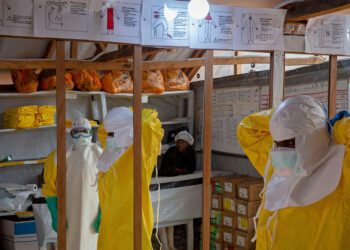With half a million people having already received multi-cancer early detection (MCED) screening, patients are and will continue to be asking about these blood tests during their visits, physicians say.
During an Education Session at the American Society of Clinical Oncology (ASCO) 2025, several experts on these tests advised on how to approach these conversations with patients and described what they think is worth sharing about them.
Front and center for the panelists of the session entitled, “Multicancer Early Detection Testing: Are There Cures Without Costs?” Was that there are not yet any randomized clinical trial results showing that a positive MCED test result will actually decrease cancer mortality or even morbidity.
“We need to see trials that show something has changed for the better for the patient. Does it really move the needle for that patient, or are we just finding [the cancer] earlier?” said Jennifer Litton, MD, professor, vice president of clinical research, and interim chair of breast medical oncology at The University of Texas MD Anderson Cancer Center in Houston.
“Are we improving survival, improving treatment, or improving toxicity?” she asked, during her presentation in the session. Beyond the physical toxicity of treatments, there is also financial toxicity to consider.
Although there are several MCED tests in the pipeline, GRAIL’s Galleri test is the only one currently on the market.
Studies of Galleri and other MCED tests still in development have so far shown that these blood-based screenings can, indeed, detect circulating tumor DNA (ctDNA) in patients who are asymptomatic, often suggesting cancer long before regular screening tests confirm it. But, thus far, there is no evidence that earlier detection saves lives, or can allow for less aggressive treatment.
While Carmen Estela Guerra, MD, the chair of the session, acknowledged that clinicians are not obligated to initiate discussions about MCEDs until more is known about their effectiveness, as guidance from the American Cancer Society states, she provided starting points and resources for discussing these tests with patients.
“It’s really important…to understand that patients may hear about Galleri tests, as will primary care physicians that might consult with us. And so we have to consider…that once people approach us, patients, primary care clinicians, that we really take this opportunity…to make sure that patients are up to date with evidence-based cancer screenings, whatever cancer screenings are appropriate for their age, sex, family history, tobacco history, and other risk factors,” said Guerra at the meeting.
She added that if patients inquire about MCEDs, clinicians first want to determine if they are even eligible for testing.
Guerra, who is professor of medicine at the University of Pennsylvania, and a general internist and cancer equity researcher at the Abramson Cancer Center, both in Philadelphia, also provided answers to several other questions patients may ask about the Galleri and other MCED tests during her presentation.
Who is Eligible to Receive the Galleri Test?
According to the Galleri website, anyone older than 50 years is eligible to receive these tests.
“Some experts have said that perhaps other people who might be eligible are those with family histories or personal histories of cancer in the past. And then, perhaps, even people with known genetic mutations, who are at risk for multiple cancers, may be eligible individuals,” Guerra said. “Again, this is expert opinion. And you may read about these potential eligibility [criteria]. But the truth is, we just don’t know yet.”
Who Can’t Receive This Screening?
“Some people have proposed pediatric populations, pregnant individuals, and patients who have had a cancer diagnosis within the past 3 years are not eligible for MCED testing,” Guerra said. “In fact, they were excluded from the [ongoing] NHS-Galleri study.”
An MCED consortium was created, which was a private, public partnership between the MCED companies, the American Cancer Society, and many other experts. This provided a list of additional risk factors “that, perhaps in the future, may also help us identify who is a potential candidate for MCED testing,” she continued.
That list, which was published in an article in JCO Precision Oncology in November 2021, includes:
- Using alcohol
- Having been exposed to cancer-causing substances (eg, fire smoke, tobacco smoke, radiation, and sunlight)
- Being immunosuppressed
- Having been exposed to infectious agents (eg, viruses and parasites)
- Having Overweight/Obesity
- Using Tobacco
How to Approach Discussions With Patients and Clinicians
One of the approaches that’s being adapted to clinicians discussing MCEDs with patients and other clinicians is the shared decision framework, Guerra explained.
That shared decision framework emphasizes that MCEDs are not replacements for evidence-based cancer screening, but that they could be additive in some cases, she said.
The shared decision model is a talk model approach.
“It starts with the option or choice talk. And that’s about basic education about MCEDs, what they detect, who is eligible, which tests are available, and how much does it cost,” she said.
The option talk involves addressing what the potential benefits and harms are, the likelihood of harm, interpretation of the tests, test uncertainties, and the option of not testing at all, Guerra continued.
Finally, to follow this model, clinicians help patients decide whether to have the testing.
Part of this includes recognizing that “some patients, after hearing all this, may not want to have the test. And that’s OK, too,” she said.
Guerrera also pointed out that other option- and decision-related talk points for approaching these conversations were published in April in the American Society of Clinical Oncology Education Book. She and her colleagues coauthored this article.
One example of a “decision talk” point in the article aimed at answering how to decide whether to have these tests is that “MCED tests are not a recommended part of your routine cancer screening at this time.”
Another is: “If you are unsure about getting tested, it may be best to wait. We can always revisit your decisions as more information becomes available.”
What are the Advantages and Disadvantages of the Tests?
During her presentation, Guerra also described some of the advantages and disadvantages to MCED screening that clinicians could speak about with their patients.
“The advantages are, obviously, that screening can occur for multiple cancers at the same time, and that MCEDs can detect cancers [for which we currently don’t have a modality], and that MCEDs have increased positive predictive value compared to single cancer screening tests,” she said.
“But you can see there’s a lot of potential disadvantages, at the moment. Much of this is because we don’t have information to inform our patients, including that patients should know that MCEDs are not currently covered by insurance,” Guerra continued. “In addition, there’s no consensus or guidelines for who should be tested and what the best testing pathway is for a positive MCED. That even if they have a ‘no cancer signal’ detected, it does not rule out future cancer diagnoses.”
With these tests, “consequential cancers could be found early, but the patient may not live longer because of overdiagnosis,” she said.
More potential disadvantages to these tests, which Guerra included in a slide for her presentation, included:
- Possible harm from unnecessary diagnostic procedures due to false positives or missed diagnoses due to false negatives
- Overdiagnosis and overtreatment of cancers that would have otherwise never bothered a patient
- Increased inequities if tests are not widely available, affordable, and acceptable to minority groups
What’s Missing and What to Offer Patients Who Want an MCED Test?
“One of the things that’s really missing to guide clinicians right now is what to do with those positive cancer signals. And there is no document that has some guidance for any of us, or even our oncologists because many clinicians, primary care clinicians, will refer those patients to oncologists,” Guerra said.
“Given the uncertainties about MCEDs, one of the options that we might offer our patients that want to have an MCED is a recommendation to enroll [in one of the MCED studies], where they will be tracked as part of the clinical trial, and where outcomes will be evaluated and inform future practice.”
Among these trials is the Vanguard study, a National Cancer Institute study that is being designed across nine geographical areas, that will enroll 24,000 participants in the US. The first two tests that will be used in this trial are Shield and Avantect, and others may be used as well, according to Guerra.
The objective of the Vanguard study is to determine if patients will be willing to even be randomized to this study and determine adherence and feasibility questions about the study, that will later inform a larger study, she said.
Another trial patients can enroll in is the REACH initiative, which is a collaboration between Grail and Medicare that will prospectively look at 50,000 Medicare beneficiaries to compare patients receiving usual care with those receiving the Galleri test.
The investigators for this study “will try to answer questions about whether there are reduced diagnoses of late stage, stage IV, and the safety and healthcare utilization,” Guerra said. This is a 3-year study across 50 sites that was initiated about 2 years ago.
More Information About Galleri
The Galleri test has a list price of $949 and is available only by prescription. It’s designed to flag the possibility of up to 50 different cancers by detecting ctDNA in a blood sample.
Because Galleri is not approved by the FDA, most insurance would not cover it or any follow-ups prompted by a positive result, according to the American Cancer Society.
GRAIL has applied for Breakthrough Device Designation and Pre-Market Approval for Galleri. The company is currently authorized to perform the test at its laboratory, which is certified by the Centers for Medicare & Medicaid Services under the Clinical Laboratory Improvement Amendments of 1988.
Litton disclosed financial relationships with UpToDate, Physicans’ Education Resource, Merck, Pfizer, and Certis.
Guerra reported financial relationships with BEAM Therapeutics, Crispr Therapeutics, Editas Medicine, Intellia Therapeutics, National Comprehensive Cancer Network, GlaxoSmithKline, Guardant Health, Impulse, Natera, Roche, Janssen, and Genentech.
Kate Johnson contributed to this report.
Katie Lennon is an oncology editor for Medscape, who has been covering medicine for the past decade of her 17-year journalism career.
Source link : https://www.medscape.com/viewarticle/mced-screening-what-patients-need-know-2025a1000iei?src=rss
Author :
Publish date : 2025-07-11 09:42:00
Copyright for syndicated content belongs to the linked Source.









